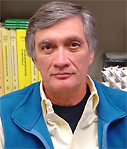The explosive element plutonium is valuable for making both energy and nuclear weapons. These dueling attributes raise difficult policy questions about what to do with spent nuclear fuel — the primary source of plutonium, which is practically nonexistent in nature.

U-M geologist and nuclear engineering researcher Rodney Ewing will discuss the options in an upcoming Distinguished University Professor lecture at 4 p.m. April 4 in Rackham Auditorium.
Ewing is the Edward H. Kraus Distinguished University Professor of Geological Sciences and a professor in the Department of Nuclear Engineering and Radiological Sciences and Department of Materials Science and Engineering. He currently is spending a sabbatical at the Stanford University Center for International Security and Cooperation examining the nuclear fuel cycle and its impact on the carbon cycle.
Against the backdrop of nuclear catastrophe in Japan, Ewing’s talk will outline pros and cons for reclaiming plutonium from spent nuclear fuel for use in reactors versus disposing of it deep in the ground.
“Plutonium has high benefit as a source of energy, but it can have a very negative impact as a weapons material, as well as if it’s released into the environment by accident or by some geologic disposal scheme,” Ewing says. “My talk will focus on how it behaves, strategies for safely disposing of it and how it would behave if it were released in an accident.”
The broader issue, Ewing says, is the extent nuclear power is used to reduce carbon emissions.
“Would you rather deal with excess carbon dioxide or excess plutonium?” Ewing asks. “If you want to expand nuclear power to reduce the use of fossil fuels, oil and coal, then that is the question. Over the long term, most of the radioactive elements in spent nuclear fuel decay away fairly quickly. It’s the plutonium that matters because it has a long half-life.”

